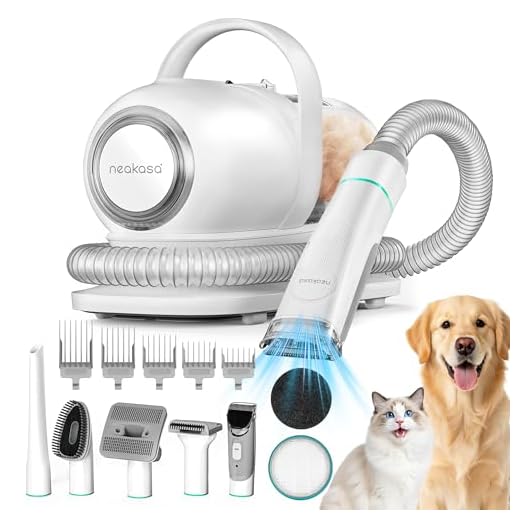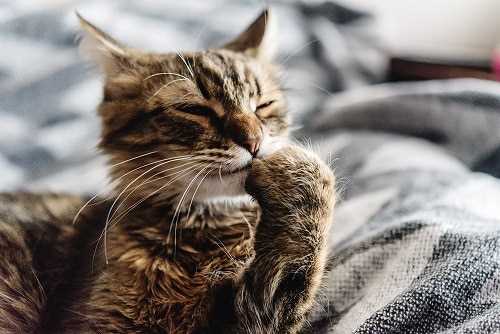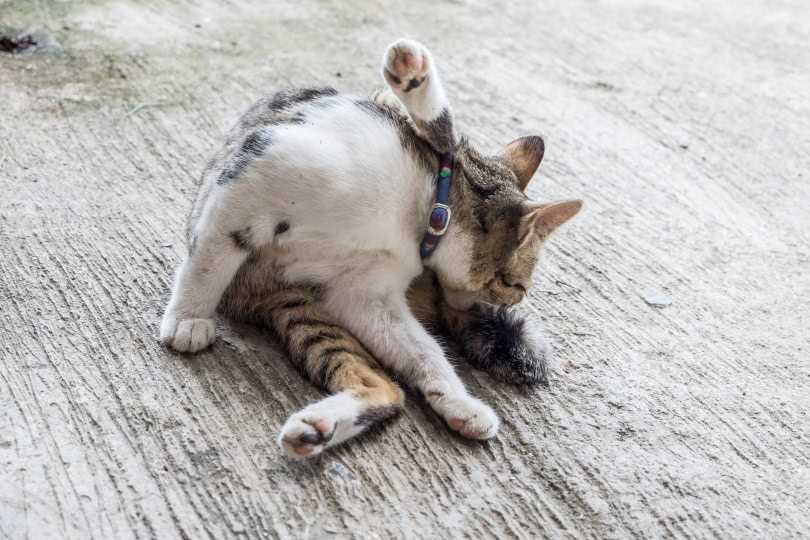



After finishing my meal, I immediately start to tidy up my fur. This behavior serves several important purposes. First, it helps remove any leftover food particles that might cling to my coat, ensuring I stay fresh and clean.
Another reason for this ritual is to maintain a pleasant scent. By licking my fur, I distribute natural oils, which keep my coat shiny and healthy. This process also provides comfort and relaxation, as the rhythmic action of grooming can be soothing.
Additionally, this habit plays a role in social interactions. By being clean, I present myself well to my companions and humans, reinforcing my status and social bonds. Keeping up appearances is crucial in feline society, even for a savvy Scottish Fold like me!
The role of grooming in hygiene
Maintaining a clean coat is crucial for overall health. Regular cleaning helps eliminate allergens, dirt, and loose fur, preventing skin issues. It’s not just about looks; it keeps parasites at bay, reducing the risk of infections.
Temperature regulation
Cleaning enhances thermal comfort. Wet fur doesn’t insulate well, so ensuring a dry coat helps in regulating body temperature. A well-maintained coat acts as a barrier against extreme weather.
Bonding and scent
Engaging in personal care isn’t solely for hygiene; it also fosters social connections. The act spreads natural scents, reinforcing familiarity. This creates a sense of security and belonging within the environment.
In conclusion, personal care is a multi-faceted behavior that significantly contributes to well-being. Prioritizing these habits leads to a healthier and happier life.
How Grooming Helps Regulate Body Temperature

Maintaining a comfortable temperature is paramount. After a satisfying meal, I often engage in a meticulous cleaning ritual. This activity plays a significant role in ensuring my body stays at an optimal temperature.
When I lick my fur, saliva spreads across my coat. As this moisture evaporates, it cools my skin, similar to how sweat works for humans. This natural cooling system becomes particularly vital during warmer days or after indulging in a hearty feast.
Insulation and Airflow
My thick coat serves as insulation, but it can also trap heat. By regularly tending to my fur, I can adjust the airflow around my body. This helps in dissipating heat buildup, especially after consuming food that may raise my internal temperature.
Behavioral Adaptations
During the grooming process, I often pause and reposition myself. These movements allow me to find cooler surfaces or areas with better airflow. This instinctive behavior keeps me comfortable and enables my body to adapt to varying environmental temperatures.
Understanding this aspect of my routine highlights the efficiency of my natural instincts in regulating heat and overall well-being.
The impact of grooming on a cat’s scent and territory

Maintaining a distinct scent is crucial for marking territory and communication. Regularly tidying up helps to eliminate any lingering odors from food or other sources. This practice ensures that my environment remains familiar and safe, both for myself and for any potential intruders.
By removing food particles and odors, I also reinforce my personal scent. This is vital in signaling to other felines that this space belongs to me. Each swipe of my tongue redistributes my natural scent from the glands located in my face and paws, enhancing my presence in my territory.
Additionally, my grooming rituals serve a social function. When I engage in this behavior, it can reassure fellow felines nearby, indicating that I am at ease and not threatened. It fosters a sense of community while simultaneously establishing boundaries.
For those times when I need to clean my living space, using the right tools can make a difference. For instance, the best pressure washer nozzle for car detailing can help keep my surroundings spotless, which complements my natural scent maintenance efforts.
Grooming as a Stress-Relief Mechanism
After enjoying a meal, I often take a moment to clean myself. It’s not just about looking tidy; it’s a soothing ritual. Engaging in this behavior helps me relax and shake off any tension I might have accumulated. This self-care routine releases endorphins, which can improve my mood significantly.
The rhythmic action of licking my fur offers a comforting sensation, almost like a warm hug. It calms my nerves, especially in environments where I might feel anxious. The repetitive motion creates a sense of predictability, which is reassuring in a world full of surprises.
In addition, spending time on this activity allows me to focus on myself and my well-being. It’s a form of mindfulness that helps me stay grounded. While I clean, I can reflect on my surroundings and assess if everything feels safe and secure. This practice is an important part of managing my stress levels, helping me feel centered and balanced.
Creating a cozy and familiar space for this routine enhances its benefits. I often choose a quiet corner or my favorite spot to unwind. This choice further reinforces my comfort, allowing me to fully engage in the process. It’s my way of asserting control over my environment and ensuring I feel good after a satisfying meal.
The Connection Between Grooming and Digestive Health
Maintaining proper digestive health is crucial for overall well-being. One way to support this is through consistent self-cleaning. This behavior helps remove food particles and prevent any potential irritation or infection in the gastrointestinal tract.
When I engage in this activity, I not only tidy up but also stimulate the production of digestive enzymes and improve circulation. This can enhance nutrient absorption, making my meals more effective. Regular hygiene practices can also reduce the risk of gastrointestinal issues, such as diarrhea, which can be a concern for many furry friends.
Additionally, a clean coat allows for better skin health, which is linked to digestion. If skin infections or irritations occur, they can divert energy from digestion, leading to suboptimal nutrient processing. Keeping my fur clean helps mitigate these risks.
| Benefits of Self-Cleaning | Impact on Digestive Health |
|---|---|
| Removes food residues | Reduces risk of gastrointestinal irritations |
| Stimulates enzyme production | Improves nutrient absorption |
| Enhances circulation | Supports overall digestive efficiency |
| Prevents skin issues | Makes digestion more effective |
For those with more serious digestive concerns, incorporating a probiotic for cats with diarrhea can be beneficial. This can complement the natural digestive health practices I engage in.
When to be concerned about excessive grooming behaviors
If I notice continuous, obsessive licking or fur pulling, it’s time to take action. This behavior may indicate underlying issues such as allergies, skin infections, or stress. Observing patterns is key; any sudden increase in grooming frequency warrants attention.
- Monitor for bald patches or skin irritation.
- Check for changes in appetite or weight.
- Watch for signs of anxiety or behavioral changes.
Signs of Physical Discomfort
If excessive self-cleaning leads to visible discomfort, such as flinching when touched, consider consulting a veterinarian. Skin conditions or parasites could require immediate treatment.
Behavioral Concerns
Increased self-care can stem from emotional distress. If a feline companion seems withdrawn or exhibits aggressive behavior, seeking professional advice could help identify stressors and lead to effective solutions.
Keeping a journal of these behaviors can offer insights to the vet, ensuring a thorough evaluation. Early intervention often leads to better outcomes for well-being.









